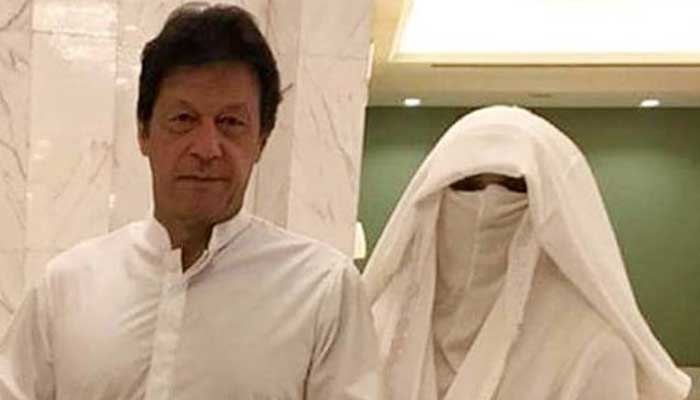IHC order terms NAB notice against Imran Khan, Bushra Bibi 'illegal'
"Notices of February 17 and March 16 are not in accordance with the law," court's order reads
ISLAMABAD: The Islamabad High Court Saturday declared the National Accountability Bureau’s (NAB) notices summoning Pakistan Tehreek-e-Insaf Chairman (PTI) Imran Khan and his wife Bushra Bibi as “illegal” in the Toshakhana case.
“NAB’s call-up notices have no legal status,” the court mentioned in its verdict.
Notices of February 17 and March 16 are not in accordance with the law, the order read.
The court’s order, issued by Chief Justice Aamer Farooq and Justice Babar Sattar, came after the PTI chief and the former first lady challenged the notices in the IHC.
Last month, IHC issued a notice to NAB for summoning Khan and his wife, in the case without following the standard operating procedures (SOPs). The anti-graft body’s Rawalpindi branch summoned had summoned the pair on March 9 hours.
Bushra Bibi's petition prayed to the court that the NAB call-up notices should be declared illegal. It moved the court to stay the inquiry by changing the investigation till the final decision of the Toshakhana case and also stay the disciplinary action against the petitioners based on the call-up notices.
Meanwhile the anti-corruption watchdog, in its notice to the former prime minister — who was ousted from office after a no-confidence motion in April last year — wrote: “The competent authority has taken cognizance of an offence allegedly committed by the accused persons under the provisions of NAO, 1999.”
The inquiry proceedings revealed that during the PTI chairman’s tenure as premier, he retained some state gifts presented to him by various foreign dignitaries.
In its decision, the IHC stated that there is no need to mention that NAB is free to issue fresh notice.
“There is no restriction on NAB for sending new notices according to the law,” the order read.
The seven-page verdict further stated that it was “needless to observe that NAB shall be at liberty to issue fresh notices to the petitioners in line with the observations made hereinabove as well as law on the subject”.
Citing Section 19(e) of the National Accountability (second amendment) Act 2022, the verdict stated that the provision under the section wasn't followed which makes it compulsory that an individual is being summoned as an accused or witness.
Moreover, the verdict stated that said that the Sindh High Court had also laid down the principles in a case back in 2007. The were the principles endorsed by the Supreme Court in the Arsalan Iftikhar case, while the IHC also followed the principles in the Rukhsana Bangash case, it added.
The principles laid down in the cited case state that the notice should contain the following:
- If notice is issued to a person, who is a suspect in an inquiry or investigation, the nature of allegations against him.
- The name and identity of complainant; if NAB has initiated inquiry/investigation, then it should be stated.
- Documents, if any, sought from person called as suspect or witness.
- If person is called as a witness, it would be so stated in call up notice.
- If custodian of any material document or record is called for examination of same, the call up notice should state so and the details of documents and record.
- Date, time and place, where person called, is to appear.
Any other relevant information. With the above-mentioned observations, the court disposed of the petitions filed by Khan and his wife.
The notice, as per the court’s order, must state who has been called as the accused or a witness as well as mention the nature of the allegations as well as the name and address of the complainant.
NAB will have to mention in the notice if it initiates the action itself, the order stated.
-
Security forces gun down 30 terrorists in multiple IBOs in KP: ISPR
-
MQM-P calls for new province in Sindh
-
US report validates Pakistan military edge over India: PM
-
Banned TTP poses serious threat to Pakistan security: UNSC panel
-
CM Afridi clarifies remarks on by-poll after ECP requests army deployment
-
Dubai sees 3.2m Pakistani passengers in 2025 as airport sets new milestone
-
Security forces kill 23 Indian proxy terrorists in KP's Kurram
-
Pakistan to construct island to boost oil exploration: report












